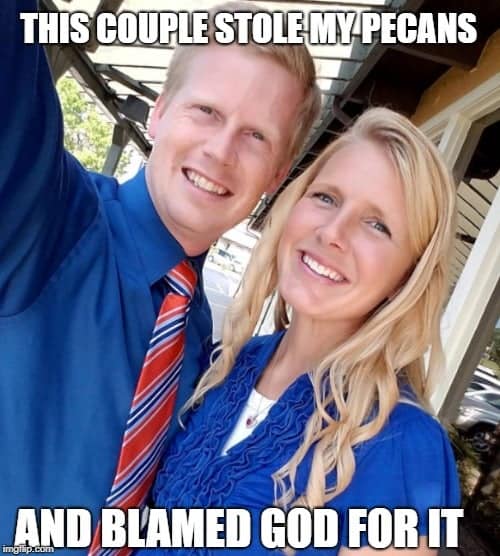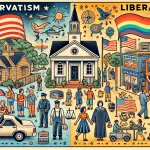A month or so ago, conservative evangelical The Gospel Coalition featured a post called “10 Questions a Pro-Choice Candidate is Never Asked by the Media.”
Debate moderators and reporters love to ask pro-life candidates hard questions about abortion. Curiously, they don’t do the same for pro-choice candidates.
I read through the ten questions listed, and I actually didn’t find them that challenging. There’s nothing there I haven’t been over a million times, whether in my own mind or in discussions with others. I have been meaning to post my answers to those ten questions, and I may still do so at some point, though I don’t have time right at the moment (sorry!).
In the meantime, Claudia has answered these questions in a guest post on The Friendly Atheist, and Adam Lee has answered them on his blog Daylight Atheism. I’d encourage you to read both sets of answers. While I may differ in some way on some specific or a given point, I find both individuals’ answers to be well thought out and interesting.
But what I want to point out here is what Adam Lee has done in his next post. In sum, he has seized the moment to turn the tables. The post on The Gospel Coalition operates from the assumption that the media is unfairly asking pro-lifers “hard questions” about abortion but not in turn asking “hard questions” on the subject to pro-choicers. The post suggests that if you start asking a pro-choice person when he or she thinks personhood begins, what he or she thinks of abortion after viability, what he or she thinks of prosecuting the murder of a pregnant woman as two separate cases of murder, etc., their position – and others support for it – will fall apart. The post similarly suggests that reporters have been unfair in asking anti-abortion politicians about things like rape.
Adam Lee points to something I’ve thought for a long time. The reality is that reporters have not been asking anti-abortion politicians the hard questions. They have actually been asking them easy questions. Here is what Adam Lee says:
Although millions of religious people want abortion to be outlawed, they’re surprisingly vague on the details. What exactly would their ideal society look like? How would they write the law and how would violators be punished? These are plainly important and relevant questions that I’ve never seen anti-choicers address in a clear and comprehensive way.
To help them clarify their vision, here’s a set of questions that would allow us all to better evaluate whether the anti-abortion movement would have good or bad consequences for women, for men, and for society as a whole.
So much yes. Click through to read the whole list, but here are some of the questions Adam Lee suggests that I found most interesting:
1. Biological evidence suggests that a large number, if not a majority, of fertilized eggs are spontaneously aborted at a very early stage of pregnancy (by some estimates, as many as 50%). Do you consider this an ongoing humanitarian crisis that urgently needs medical research?
2. If you could write the law however you saw fit, how would you enforce a ban on abortion? For example, in El Salvador, when women come to hospitals seeking treatment for a miscarriage, they can be detained until a forensic vagina investigator can arrive and perform an exam to see if they had an illegal abortion. Would you have something like this? If not, what enforcement mechanism would you have?
…
5. What do you think the penalty should be for doctors who perform abortion?
6. What do you think the penalty should be for women who seek out an abortion?
…
8. Since IVF clinics also create and discard fertilized embryos, would you also be in favor of outlawing IVF?
…
10. If you would, address this purely hypothetical situation: There’s a five-alarm fire at a fertility clinic, and you’re the first firefighter to enter the building. On one side of the building, there’s a petri dish with half a dozen frozen embryos. On the other side, there’s a cowering five-year-old girl. You only have time to save one. Which would you choose and why?
The first question here is one I tackled in my post on how I lost faith in the pro-life movement. Numbers 2, 5, and 6 are questions I plan to tackle in upcoming posts about what making abortion illegal might look like. Number 8 was an especially good point to ask in the last election given that Mitt Romney endorsed the personhood amendment even though he had a grandchild conceived using IVF. One wonders if he ever worries about his frozen grandchildren presumably still stored in a frozen embryo facility. And finally, number 10. Yeah.
Let me just take a moment to say how I would have addressed these questions when I was pro-life – and how I did address the ones that came up.
For question number 1, well, as I said in my earlier post on the pro-life movement, I had no idea that so many fertilized zygotes failed to implant. Since I considered those zygotes to be people, I would have been horrified by this. I probably would have hedged by saying that they died naturally, and that it probably wasn’t possible to save them (hence no research to do so), and that it was a result of the sin and death unleashed on the world by the fall (Answers in Genesis taught that all sorts of things from mosquitoes to meat eating animals to tumors were all a result of the fall.) Of course, I don’t actually think this answer is adequate, since we do medical research with the goal of trying to cure all sorts of terrible conditions. Why treat zygotes that fail to implant so very differently?
As for numbers 2, 5, and 6, to be honest, I never put much thought into what making abortion illegal would really look like in terms of enforcement or punishment. I definitely would have balked at the idea of investigating miscarriages, but that really seems the only way to catch every incidence of abortion, whether self-induced or performed with the aid of a doctor or other individual. I also would have balked at the idea of imposing the death penalty even as I acknowledged that they really technically should be charged for murder. These are areas where logic told me one thing and every natural inclination told me something else. Adam Lee’s point, that those who oppose abortion need to clarify exactly what it is they want, is extremely important.
On question number 8, I’ll simply say this. I did believe that all those frozen embryos in all those medical facilities were actual people with full rights, including the right to eventually be born. I was an avid supporter of the “snowflake” program, wherein women “adopt” frozen embryos, have them implanted in their wombs, carry them to term, and give birth to them. Parents of these “snowflake” children have used them as political tools, bringing them to Washington, D.C., and the halls of Congress to show them off as proof that abortion really is murder and that an embryo really is a person. So yes, I did impose in vitro fertilization.
Finally, question 10. I’ll admit it – I was asked this question in my anti-abortion days, and it did trip me up. This is another question where logic told me one thing and every emotional response in me said something else. Logically, I knew I should choose the embryos. Practically, though, I wasn’t sure I would be able to leave the five-year-old. I have heard opponents of abortion answer the question by talking about minimizing pain, and that that five-year-old would die in agony while the embryos would be snuffed out without feeling a thing or even being able to have regrets or snuffed out dreams. But as soon as you start playing that game, you can’t really reject it when you’re talking about the feelings and dreams of a grown woman as opposed to, say, a first trimester fetus which, like those embryos, has zero chance of having feelings or consciousness.
Anyway, I think Adam Lee is spot on about needing to ask these sorts of questions. We need to be asking them more often. I also think Lee’s bonus question is of similar importance:
Bonus question for evangelical Christians: Until the late 1970s, many prominent evangelicals were pro-choice. Clearly, opinions on this matter have changed very dramatically in a relatively short amount of time. What do you think accounts for this?
I’ve seen evangelicals respond to this by saying that Christians were once okay with slavery too, and then they changed their views to become more in tune with morality and what God’s Word really says, and that all they’ve done here is the same thing. In other words, being okay with abortion in the past does not mean that being against it today is automatically wrong or hypocritical. This is absolutely true. However, I somehow thought that Christians had always and without exception – true Christians, at least – been against all abortion without exception. I thought that the idea that God installs the soul at fertilization was a natural and ancient Christian teaching. Understanding that this is simply not the case – even in the Catholic Church – is important context for any discussion of abortion that involves religious arguments or motivations.













